“O
thou that bringest glad tidings to Zion, go up on the high mountain;
lift up thy voice with strength, thou that bringest glad tidings to
Jerusalem; lift it up, fear not; say unto the cities of Juda, Behold
your God!”
(Isaiah 40:9)
Behold Your God
***
WND
IS TIME RIPE FOR ANOTHER JESUS REVOLUTION?
Exclusive: Greg Laurie makes key distinction between 'awakening' and 'revival'
By Greg Laurie
July 21, 2018

The last great spiritual awakening in America was the Jesus movement, which took place about 40 years ago. I was there, and I think we can not only learn from history, but we can be inspired by history.
A few years earlier, an April 8, 1966, Time magazine cover posed this question: “Is God Dead?” What a difference a few years can make, especially when God intervenes. Five years later, a 1971 issue of Time described a spiritual awakening: “Jesus is alive and well and living in the radiant spiritual fervor of a growing number of young Americans. … If any one mark clearly identifies them, it is their total belief in an awesome, supernatural Jesus Christ, not just a marvelous man who lived 2,000 years ago, but a living God.”
The words revival and awakening are often used interchangeably, but there is a distinction. An awakening takes place when God sovereignly pours out his Spirit and it impacts a culture. That is what happened during the Jesus Revolution, and it’s what happened in multiple spiritual awakenings in the history of the United States, predating its establishment as a nation.
A revival, on the other hand, is what the church must experience. It’s when the church comes back to life, when the church becomes what it was always meant to be. It’s a return to passion. I think many times we overly mystify the idea of revival, but we don’t really need to. Another word I could use for revival is restoration – restoring something to its original condition.
If I’m cruising down the road and see a cool, classic car that has been restored to showroom condition, I think, “Wow, that’s beautiful! Someone took time to do that.” That can happen in a life as well. And it’s what the church needs.
R.A. Torrey, a friend of Dwight L. Moody, was a great preacher and evangelist in his own right. He gave this prescription for revival during a February 1917 address at Moody Bible Institute:
“Let a few of God’s people, they don’t need to be many, get thoroughly right with God themselves – the rest will count for nothing unless you start right there; then let them band themselves together to pray for a revival until God opens the heavens and comes down. Then let them put themselves at God’s disposal to use them as He sees fit. That will bring a revival to any church, any community.”
Let’s review: 1) Get right with God, 2) get together with other Christians and pray for revival, and 3) make yourself available to God, especially in winning souls.
Spiritual awakening, that outpouring of the Spirit, is up to God. We can’t organize it, but we can agonize for it in prayer and call upon God to send it.
What are some signs of revival? One of them is that people are hungry for God’s Word, the Bible. We don’t worship the Bible; we worship the author of the Bible. The Bible is the autobiography of God, so as we read the Scriptures, we discover him.
I still have my Bible from those Jesus Revolution days. It was my first Bible, and it’s all marked up. There are little handwritten notes in the margins, and tape is holding some of the pages together. I happen to like worn-out Bibles, because it’s been said that a Bible that is falling apart is a good indication of a life that isn’t.
Before there can be a revival in the church, there must first be a revival on an individual level. Revival starts with you. It starts with me. It starts with realizing that God wants to revive each of us personally.
Jesus said to the church of Ephesus, “I have this against you, that you have left your first love. Remember therefore from where you have fallen; repent and do the first works, or else I will come to you quickly and remove your lampstand from its place – unless you repent” (Revelation 2:4–5 NKJV).
In these verses we find the three R’s of getting right with God, the three Rs of having a spiritual revival personally. First, remember. Were things different before? Was your faith stronger before? Remember that. Mark it. Second, repent. Change your direction. Do a U-turn. And three, repeat. Do those things you used to do. Remember from where you have fallen.
Revivals don’t last forever. They have a beginning, a middle and an end. A revival is a little bit like an explosion, kind of like a starting car. But then sometimes we lose sight of it, and we need another revival and then another one.
Someone once asked the evangelist Billy Sunday whether his revivals lasted. He replied, “No, neither does a bath. But it’s good to have one occasionally.” It’s good to ask God to revive us again and again. I know that I need constant revival. You do, too. We all do.
Looking back on the late 1960s and early 1970s, I see a lot of parallels between then and now. I’ve recently read a lot of interesting articles about this, which note the similarities. It was a divided nation back then. Things were very dark. But when things are very dark, God’s light can shine brightly. I think we’re due for another Jesus Revolution.
Here is what it comes down to: America needs a spiritual awakening. And the church needs a revival.
***
BREAKINGISRAELNEWS
Scientist: Creation of Earth Calibrated to Mount Moriah
By Adam Eliyahu Berkowitz
“Thus said Hashem: I set this Yerushalayim in the midst of nations, with countries round about her.” Ezekiel 5:5 (The Israel Bible™)
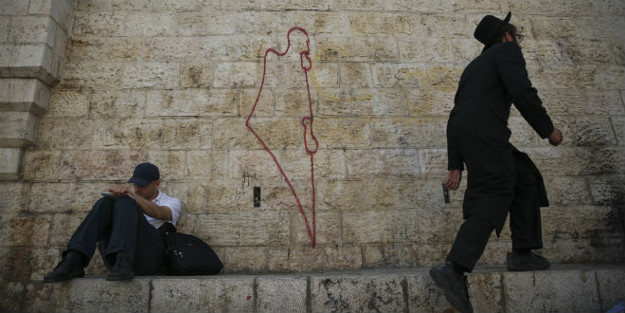
An Ultra Orthodox man walks by a graffiti drawing of a map of Israel at the Damascus Gate in Jerusalem’s Old City. (Credit: Hadas Parush/Flash90)
The scientist who mathematically proved prophecy claims his formula has cosmic implications, showing that the creation of the world was calibrated according to the location of Jerusalem and the return of the Jews to Israel. According to the scientist, Saul Kullook, his discovery is indisputable proof of the existence of the God of Israel.
Last month, Breaking Israel News published a synopsis of Kullook’s remarkable discovery. Simply stated, he discovered that the dates of major events affecting the return of the Jewish people to the Land of Israel can be numerically obtained by a mathematical relation between two observable physical factors: the inclination of the planet and the latitude of the Biblical borders in Israel.
“This is not a theory,” Kullook explained to Breaking Israel News. “It was there, waiting to be seen. I just worked out the mathematical proof.”
His discovery is phenomenal in its own right, but Kullook’s conclusions describing the implications of this are even more momentous.
“Put simply, my discovery shows the proof of the God of Israel,” Kullok said. “People talk about the God of Israel everywhere but not as if it is true, verified and proven. But here it is, mathematically proven.”
Kullok explained how he came to this conclusion.
“There are at least 15 points of correlation between the historical migrations of the Jews into Israel, the Biblical borders of Israel, and shift in the axis of the planet,” Kullook said. “This shows that the planet is changing the inclination of its axis according to the history of the Jews in relation to Israel and the geography of Biblical Israel. Each correlation taken by itself is remarkable but taken as a whole,it is a direct relationship that is statistically undeniable. There is no possibility that this is by chance.There is an irrefutable underlying causation: Hashem (God, literally ‘the name’) created the Earth according to this preset plan of the Jews and Israel based around Jerusalem.”
“When Hashem created the world, he had all of history, heavens and earth and man, all set out, based on Jerusalem and the Jews. The parameters in which the creation was performed were calibrated according to the location of Mount Moriah. The relation of the sun and the moon to the earth were fixed and after Joshua brough the Jews into Israel, there was no changing it.”
Kullook has one exception to this preordained timing.
“When the sun stood still for Joshua, that was a final adjustment, Kullok said, referring to the Biblical account of the sun standing still when Joshua fought five armies.
“And the sun stood still, and the moon stayed, until the nation had avenged themselves of their enemies. Is not this written in the book of Jashar? And the sun stayed in the midst of heaven, and hasted not to go down about a whole day.” Joshua 10:13
“After the Jews came into Israel, this framework, establishing history according to the geography of Israel and, specifically, Jerusalem, there were no more changes,” Kullook said.
Kullook’s theory seems to be Judeo-centric, implying that the Earth was created for the sake of the Jews and Israel. But Kullok emphasized that the opposite is true: the relationship between Israel and creation was in order for the rest of humanity to discover Hashem for themselves.
“A main implication of this fine-tuning of the Solar System is that objective evidence will be provided to all people on Earth, proving the existence and actions of the God of Israel, irrespective of their religious or non-religious beliefs,” he explained.
The theory, therefore, has modern-day political implications.
“If there is a force that can direct the inclination of the planet based on the borders of Israel, anyone who tries to change the borders of Israel or the return of the Jews to Israel is going against this and the system will react,” Kullook warned. “The connection between the Jews and Jerusalem is not political or even Biblical: it is the basis for the creation of the world and a force of nature.”
Kullook has attempted to present his theory and proofs in scientific forums but has been largely ignored and denied the opportunity to defend them. A true scientist, he welcomes objective scrutiny but is dubious, believing the scientific community is not ready for the Divine implications.
This is the first time ever that objective evidence from mathematical results has been found that brings proof of a cosmic kind of influence on the Solar System in accordance with the words in the Hebrew Bible,” Kullook said. “It is expected that people will resist believing that this scientific demonstration of the existence of the God of Israel is correct. A confirmation of these mathematical results implies the need of a great change in our understanding of the physical universe and its laws and of life in this planet. We need to scrutinize our understanding of the earthquakes and cataclysms that may affect the Land of Israel, as predicted by several prophets in the Hebrew Bible.”
“I sincerely hope that there will be scientists or research Institutions ready to check my findings,” he said. “This is something that is relatively easy and can be done in a very short time. I am ready to provide the formulae and calculation method used in this research study.”
***
JEWISHPRESS.com
IDF’s Commando Rabbi Wasn’t Joking about Rebuilding the Temple
By Jni.Media
July 9, 2018

Letter from an IDF Commando Rabbi about Tisha B'Av.
Captain Rabbi Avrumi Levin: “In case the Temple is rebuilt, consider this [Tisha B’Av] document null and void.”
Next week is Tisha B’Av, the Jewish people’s national day of mourning. It is the day when the Jewish people fast and mourn for the long list of tragedies that befell the Jewish nation over the millennia, particularly the destruction of the two Temples in Jerusalem.
Advertisement
It is not uncommon to hear people say that they will be reading Megilat Eichah (Book of Lamentations) at such and such place, unless the Mashiach (the Messiah) comes first or the Temple is rebuilt – as by most rabbinical opinions, Tisha B’Av will most likely be cancelled as a day of mourning when that happens, or at a minimum, many of the practices will change.
The rabbi of the IDF’s special commando unit is no exception.
Captain Rabbi Avrumi Levin sent out his Tisha B’Av halachic (Jewish law) guidelines to the soldiers in the commando unit where he serves.
At the end of his letter he added, “In case the Temple is rebuilt, consider this document null and void.”
This of course makes perfect sense, as when the Temple will be rebuilt, the laws of Tisha B’Av in that guideline will become irrelevant.
Needless to say, Uri Misgav, a writer for the far-leftwing Ha’aretz apparently found it offensive and religiously coercive that the good rabbi would consider the rebuilding of the Jewish Temple a reasonable possibility. On his Facebook post, Misgav writes that he actually considers that option scary.
The frightened Uri Misgav checked with the IDF spokesperson, who told Misgav that the line was written in jest.
But as even the youngest religious Jewish child knows, the line was not written in jest, it is a halachic fact – when the Jewish Temple will be rebuilt, the current laws and practices of Tisha B’Av, including the guidelines in that particular IDF document, will become null and void.
***
Al-Monitor
Turkey, Israel battle over Temple Mount
Ben Caspit
July 11, 2018
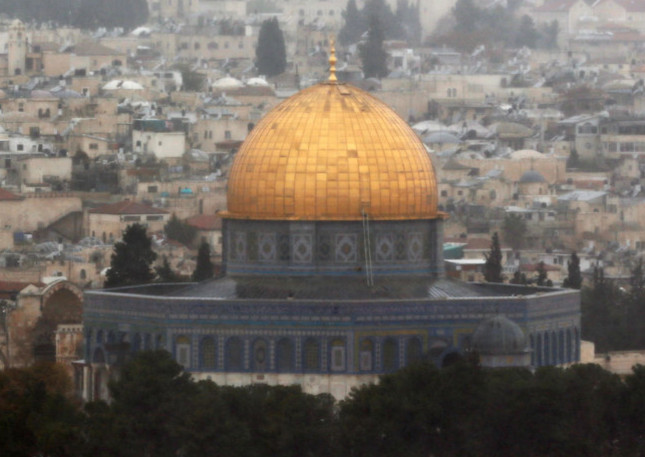
Israel and Turkey are again on a collision course. The official reason, at least this time, is not the blockade on Gaza or the diplomatic peace process with the Palestinians, but the Temple Mount. Israel’s Security Cabinet is supposed to devote one of its upcoming meetings to the activities and growing influence of Turkish President Recep Tayyip Erdogan on the Temple Mount. Erdogan maintains this influence via a series of nonprofit associations that he funds, headed by the Turkish Cooperation and Development Agency (TIKA).
Turkish activity on the Temple Mount worries not only the Shin Bet, the Israel Police and the entire security system, but even the other contenders for the plaza: the Jordanians, the Palestinians, the Egyptians and even the Moroccans who view their king, Mohammed VI, as the keeper of the holy places. According to intelligence material that Israel has been accumulating, Erdogan is trying to snatch the Temple Mount and the title of “Protector of the Mount” in the name of all of Islam from all the other contenders to the throne. The first antagonist that is supposed to foil these schemes is, like always, Israel.
After the 2016 reconciliation between Israel and Turkey, in which Israel shelled out $21 million as compensation to the families of the people who were slain on the Mavi Marmara and expressed an apology, the tense relations between the two countries improved somewhat. The ambassadors returned to Ankara and Tel Aviv, and it had seemed that the crisis had passed. But ahead of the June 2018 elections in Turkey, Erdogan began to attack Israel in louder and louder tones. “He needs to divert the agenda of his election system from the crash of the Turkish lira to some external scapegoat. And, of course, he found us,” said a senior Israeli Cabinet member to Al-Monitor before the elections, on condition of anonymity. But the elections came and went, and Erdogan continues to grasp the crass anti-Israel ticket with all his strength.
“He continues to throw tantrums,” a high-placed security source told Al-Monitor this week on condition of anonymity. “His self-confidence has reached an all-time high; he now views himself as a Turkish sultan, ready to renew the Ottoman Empire. Nothing can stop him, and he allows himself everything. But if he tries to tighten the rope too much in Jerusalem,” the source added, “he will discover his mistake.”
On July 9, Israel’s National Security Council presented an action program formulated against the associations connected to Turkey that contribute to inflaming tension and agitation on the Temple Mount. Most of the focus is on TIKA. Recently, intel on this organization shows that it maintains widespread connections with the radical northern wing of Israel’s Islamic Movement as well as with Hamas sources. According to a publication by researcher Pinhas Inbari, a member of the Jerusalem Center for Public Affairs, TIKA is directly linked to the IHH Turkish organization that backed the Marmara flotilla and was labeled by Israel (and others) as a terrorist organization.
There’s even more. According to Israeli intelligence sources, TIKA pours dozens of millions of shekels, or even hundreds of millions of shekels according to some versions, to fund Islamic activities on the Temple Mount (a shekel is worth about 27 US cents). “Anyone who visited the Mount in the last year, knows that the place is full of Turkish flags and also Turkish tourists as well,” an Israeli security source well versed in Eastern Jerusalem issues told Al-Monitor on condition of anonymity. “These are not mere tourists,” the source continued, “but Islamic activists who flow to the Temple Mount to replace the Mourabitoun and Mourabitat associations that Israel recently made illegal.” These associations have harassed Jewish visitors to the Temple Mount and were banned following accusations of inciting violence.
The Israelis are convinced that Erdogan is trying to return Ottoman grandeur to the Temple Mount to intensify tension between Jews and Muslims in the holy places and become the top Islamic figure to protect the mosques and Al-Aqsa. “We won’t let this happen, no way,” an Israeli security source said on condition of anonymity.
Israel’s Foreign Ministry, which objected to the action plan created against TIKA until recently, is now conforming to the party line and admits that there is no choice but to halt the process before it causes real damage. Israel expends a lot of energy in lowering tensions on the Temple Mount, and officials are acutely aware that a blowup there could quickly put the entire Middle East on fire. It was only on July 3 that Prime Minister Benjamin Netanyahu canceled the sweeping prohibition he had imposed on Knesset members from frequenting the Temple Mount. From now on, all Knesset members are permitted to ascend the Mount (but not pray there) once every three months. The wave of individual Palestinian terror that began more than two years ago, and has since died down, had emerged from the firebrands of Al-Aqsa. And Israel is determined to halt that.
“We’re not the only ones,” a senior Israeli political figure told Al-Monitor on condition of anonymity. “People from Amman and other places share our worry over Turkey’s growing influence on the Temple Mount. No one, except for Hamas, approves of Erdogan making inroads into our region. We have no intentions of making his life easy with regard to these issues.” Israel cannot make TIKA illegal, since it is not listed in Israel. But Israel can require the association to receive prior authorization for every activity it performs in the territories over which Israel rules. “The quantities of money they pour here are huge,” a senior Israeli diplomatic source told Al-Monitor on condition of anonymity. “Even the number of Turkish tourists has recently risen significantly. These are the kinds of Islamic tourists who pour into the Temple Mount and on the way try to raise as many riots as they can, complete with curses and swearing and invectives in the old Jerusalem Armenian Quarter.”
At the moment, a plan of action that was formulated to counter Erdogan’s increasing influence on the Temple Mount has not been approved for implementation. As aforementioned, the Cabinet is supposed to discuss and authorize it. “We will closely examine Erdogan’s actions in the coming weeks,” a high-placed source in the Israeli Cabinet said on condition of anonymity. “If he signals to us that he wants peace, that’s one thing. But if it turns out that the 'new,' post-elections Erdogan wants to stir up trouble, he’ll find a very tough opponent on our side.”
In the middle of May, Israel expelled the Turkish consul from East Jerusalem and instructed him to return to Ankara for “consultations” for a period of time. This action was taken after the Turkish ambassador in Tel Aviv was returned to Ankara and the Israeli ambassador in Ankara was expelled. At this point, Israel has no intentions of letting the Turkish consul return.
“The Turkish Consulate in East Jerusalem is viewed as a wasp’s nest. It inflicts more damage than it helps,” a high-level Israeli diplomatic figure told Al-Monitor on condition of anonymity. “If Erdogan wants to get his foot in the door again [in Israel], he has to lower his tone and return to the rules of acceptable behavior.” But no one in Jerusalem really believes this will happen. It seems that Erdogan wants escalation, not peace.
American Thinker
History Explains Eastern European Hostility to Islam
By Raymond Ibrahim
July 18, 2018
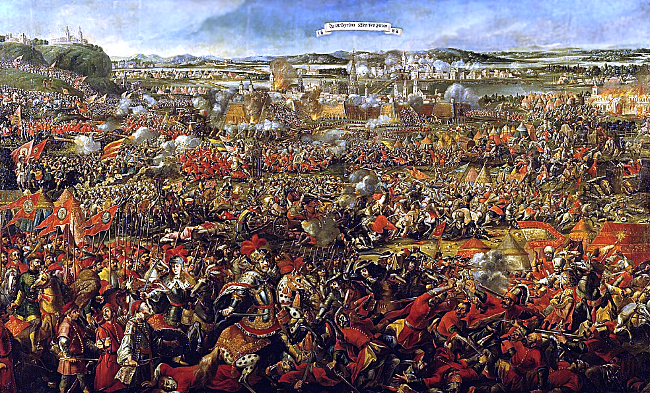
Why have several Eastern European nations been so adamant against taking in Muslim migrants? Most recently, when Polish lawmaker Dominik Tarczyński was asked earlier this month how many "refugees" Poland has taken in, he flatly responded: "Zero."
When the British interviewer, whose nation has taken in millions of Muslim migrants, scoffed, "And you're proud of that?," he said: "We will not receive even one Muslim, because this is what we promised [to voters] ... this is why our government was elected; this is why Poland is so safe, this is why we have not had even one terror attack."
Considering that "[t]housands of Catholics formed a human chain along the borders of Poland" late last year "to pray for peace and 'against the Islamisation of Europe,'" it is clear that the Polish government is acting on behalf of the people.
What accounts for this staunchly anti-Islamic response? The answer rests in history. Unlike most Western European nations, which, thanks to their geographical proximity, have for centuries been out of the reach of – and thus have forgotten all about – Islam, Eastern Europeans are intimately acquainted with it.
Indeed, an event that occurred this week in history sheds much light on the current situation. On July 14, 1683, the largest Islamic army ever to invade European territory – which is saying much, considering the thousands of invasions preceding it since the eighth century – came and surrounded Vienna, the heart of the Holy Roman Empire and de facto nemesis of Islam.
Some 200,000 Muslim combatants, under the leadership of the Ottomans – the one state in nearly fourteen centuries of Islamic history most dedicated to and founded on the principles of jihad – invaded under the same rationale that so-called "radical" groups, such as the Islamic State, cite to justify their jihad on "infidels." Or, to quote the leader of the Muslim expedition, Grand Vizier Kara Mustafa, because Vienna was perceived as the head of the infidel snake, it needed to be laid low so that "all the Christians would obey the Ottomans."
This was no idle boast; sources describe Mustafa as "fanatically anti-Christian." After capturing a Polish town in 1674, he ordered all the Christian prisoners to be skinned alive and their stuffed hides sent as trophies to Ottoman Sultan Muhammad IV.
Such supremacist hate was standard and on display during the elaborate pre-jihad ceremony presaging the siege of Vienna. Then, the sultan, "desiring him [Mustafa] to fight generously for the Mahometan faith," to quote a contemporary European, placed "the standard of the Prophet ... into his hands for the extirpation of infidels, and the increase of Muslemen."
Once the massive Muslim army reached and surrounded the walls of Vienna on July 14, Mustafa followed protocol. In 628, his prophet Muhammad had sent an ultimatum to Emperor Heraclius: aslam taslam, "submit [to Islam] and have peace." Heraclius rejected the summons; jihad was declared against Christendom (as enshrined in Koran 9:29); and in a few decades, two thirds of the then-Christian world – including Spain, all of North Africa, Egypt, and Greater Syria – were conquered.
Now, over a thousand years later, the same ultimatum of submission to Islam or death had reached the heart of Europe. Although the Viennese commander did not bother to respond to the summons, graffiti inside the city – including "Muhammad, you dog, go home!" – seems to capture its mood.
So it would be war. On the next day, Mustafa unleashed all Hell against the city's walls, and for two months, the holed up and vastly outnumbered Viennese suffered plague, dysentery, starvation, and many casualties – including women and children – in the name of jihad.
Then, on September 12, when the city had reached its final extremity, and the Muslims were about to burst through, Vienna's prayers were answered. As an anonymous Englishman explained:
After a siege of sixty days, accompanied with a thousand difficulties, sicknesses, want of provisions, and great effusion of blood, after a million of cannon and musquet shot, bombs, granadoes, and all sorts of fireworks, which has changed the face of the fairest and most flourishing city in the world, disfigured and ruined [it] ... heaven favorably heard the prayers and tears of a cast down and mournful people.
The formidable king of Poland, John Sobieski, had finally come at the head of 65,000 heavily armored Poles, Austrians, and Germans – all hot to avenge the beleaguered city. Arguing that "[i]t is not a city alone that we have to save, but the whole of Christianity, of which the city of Vienna is the bulwark," Sobieski led a thunderous cavalry charge – history's largest – against and totally routed the Muslim besiegers. (See Sword and Scimitar for a detailed recounting of this pivotal battle.)
Although a spectacular victory, the aftermath was gory: before fleeing, the Muslims ritually slaughtered some 30,000 Christian captives collected during their march to Vienna, raping the women beforehand. On entering the relieved city, the liberators encountered piles of corpses, sewage, and rubble everywhere.
It is this history of Islamic aggression – beginning in the fourteenth century, when Muslims first established a foothold in southeastern Europe (Thrace), and into the twentieth century when the Ottoman sultanate finally collapsed – that informs Eastern views on Islam.
As one Pole, echoing the words of Sobieski, said during last year's human chain demonstration, "a religious war between Christianity and Islam is once again underway in Europe, just like in the past."
Whereas Western nations cite lack of integration, economic disparities, and grievances to explain away the exponential growth of terrorism, violence, and rapes that come with living alongside large Muslim populations, Eastern nations see only a continuity of hostility.
Raymond Ibrahim, author of The Al Qaeda Reader, Crucified Again, and most recently Sword and Scimitar: Fourteen Centuries of War between Islam and the West, is a Judith Rosen Friedman fellow at the Middle East Forum and a senior fellow at the Gatestone Institute.
Editor's note: A portion of this article was excerpted from the author's new book, Sword and Scimitar: Fourteen Centuries of War between Islam and the West (foreword by Victor Davis Hanson). All quotes are sourced there.
***
RT
American Jews slam Israel’s ‘racist’ nation-state bill as thousands protest against it in Tel Aviv
July 14, 2018

Protesters rally against the 'Jewish Nation-State Bill' in Tel Aviv on July 14, 2018 © Jack Guez / AFP
Thousands of people have taken to the streets of the Israeli capital in protest against the so-called nation-state bill, which, they say, would enable ethnic segregation. The controversial bill also drew criticism from US Jews.
Demonstrators marched through the streets of Tel Aviv chanting: “Full equality and no less,” “Jews and Arabs refuse to be enemies" and "The nation bill is a disaster," according to witnesses.
"The Nation-State Law would turn racism, discrimination, and segregation into an inescapable part of our lives. More than that – racism and discrimination are becoming desired and central in the State of Israel. The Nation-State Law will bring exclusion and damage to minorities to terrifying levels we have never seen before. Our stance is clear: all citizens –all– are equal,” the organizers of the rally stated, as cited by the Jerusalem Post.
Between 2,500 and 7,000 people took part in the rally, according to various Israeli media reports. The demonstration was organized by a wide range of NGOs, rights groups and at least four Israeli political parties. The march was reportedly led by some members of the Knesset – the Israeli parliament.
The bill in question, which is currently being debated in the Knesset and is expected to come to a final vote on Monday, declares Israel the nation-state of the Jewish people. Opponents of the controversial legislation say it would prioritize Jewish values over democratic ones and effectively endanger the rights of Israeli Arab citizens as well as even secular Israelis.
One of the most controversial clauses of the new bill envisages the establishment of settlements or communities that are segregated by religion or nationality. “The state may allow a community, including members of one religion or of one nationality, to maintain a separate communal settlement,” the provision says, according to the Jerusalem Post. This particular clause even drew criticism from Israeli President Reuven Rivlin. Israeli Prime Minister Benjamin Netanyahu’s government, however, actively supports the legislation.
“The law of division and discrimination that this government is promoting – which they call the Nation-State Bill – will leave a great many of us out; out of towns with “admission committees; out of fair treatment in the courts; out of citizenship; out of democracy. To this, we will not agree,” the groups participating in the rally said in a statement.
The controversial bill also drew criticism from abroad, particularly from US Jews: 14 American Jewish organizations expressed their concerns over the legislation to the incoming Jewish Agency Chairman Isaac Herzog, who is also the opposition leader in the Knesset.
Some of these groups, such as the New Israel Fund, also took part in Saturday’s rally. “This is tribalism at its worst,” the New Israel Fund CEO Daniel Sokatch told Haaretz. “Beginning with Israel’s Declaration of Independence, the Jewish value of human dignity and the principle of the equality of all people have formed the democratic foundation of the state. This law is completely incompatible with those values,” he added.
Meanwhile, if adopted, the nation-state law would acquire the status of a “basic” law, which gives it a power equal to the constitution (even though Israel does not have a written one). “If racism, sexism, and religious fundamentalism are to be protected in Israel’s basic laws, it should be no surprise when the country embodies those values. This bill and the government that supported it are a danger to Israel’s future,” Sokatch, who even wrote a piece on the issue for the San Diego Jewish World media outlet, warned.
Others were seemingly also concerned over Israel’s international reputation. Rabbi Rick Jacobs, President of the Union for Reform Judaism, particularly warned that adoption of the bill would “make Israel an open target on the world stage for all those who seek to deny the Jewish people our right to a homeland.”
The news comes just days after the Irish Senate, the upper house of parliament, supported a bill that makes it illegal to import goods produced in the illegal Israeli settlements built on the Occupied Territories in the West Bank. The move prompted the Israeli Defense Minister Avigdor Liberman to call for Israel’s embassy in Ireland to be closed “immediately.”
The Guardian
EU leads criticism after Israel passes Jewish 'nation state' law
Legislation stipulates only Jews have right of self-determination in the country
Peter Beaumont
July 19, 2018
Israelis hold placards reading: ‘This house belongs to all of us,’ during a protest against the controversial ‘nation state’ law. Photograph: Abir Sultan/EPA
The European Union has led a chorus of criticism after Israel passed a controversial law declaring that only Jews have the right of self-determination in the country.
Adding that the legislation would complicate a two-state solution to the Israel-Palestinian conflict, the EU joined Israeli Arab political leaders, Israeli opposition politicians and liberal Jewish groups in the US in flagging up concern, with some saying the law amounted to “apartheid”.
The legislation stipulates that “Israel is the historic homeland of the Jewish people and they have an exclusive right to national self-determination in it”.
It also strips Arabic of its designation as an official language alongside Hebrew, downgrading it to a “special status” that enables its continued use within Israeli institutions.
“We are concerned, we have expressed this concern and we will continue to engage with Israeli authorities in this context,” said a spokeswoman for the EU foreign affairs chief, Federica Mogherini.
“We’ve been very clear when it comes to the two-state solution, we believe it is the only way forward and any step that would further complicate or prevent this solution of becoming a reality should be avoided,” the spokeswoman added.
The law was also condemned by the Turkish foreign ministry, which said the legislation trampled on the principles of universal law and disregarded the rights of the Palestinian citizens of Israel.
Some of the strongest language was used by the head of the Israeli Arab Joint List group of parties, Ayman Odeh, who denounced it as “the death of our democracy”.
He added: “[The Knesset] has passed a law of Jewish supremacy and told us that we will always be second-class citizens.”
In a moment of ironic timing, the legislation was passed just hours before Israel’s prime minister, Benjamin Netanyahu, welcomed a visit by Hungary’s far-right leader, Viktor Orbán, who Israeli critics have accused of praising Nazi-era antisemitic collaborators.
The “nation state” law, backed by the rightwing government, passed by a vote of 62-55with two abstentions after months of political argument. Some Arab MPs shouted and ripped up papers after the vote.
“This is a defining moment in the annals of Zionism and the history of the state of Israel,” Netanyahu told the Knesset.
Last week he said: “We will keep ensuring civil rights in Israel’s democracy but the majority also has rights and the majority decides. An absolute majority wants to ensure our state’s Jewish character for generations to come..”
The law was condemned by Yohanan Plesner, the head of the Israel Democracy Institute, who described it as “jingoistic and divisive” and an “unnecessary embarrassment to Israel”.
The legislation, which will become part of Israel’s “basic laws” that make up its quasi-constitution, was also condemned by the president of the Union for Reform Judaism, which represents the largest Jewish denomination in the US “This is a sad and unnecessary day for Israeli democracy,” said Rabbi Rick Jacobs.
“The damage that will be done by this new nation state law to the legitimacy of the Zionist vision and to the values of the state of Israel as a democratic – and Jewish – nation is enormous.”
There are 1.8 million Arabs in Israel, about 20% of the total population.
Early drafts of the legislation went further in what critics at home and abroad saw as discrimination towards Israel’s Arabs, who have long said they are treated as second-class citizens.
Clauses that were dropped in last-minute political wrangling – and after objections by Israel’s president and attorney general – would have enshrined in law the establishment of Jewish-only communities, and instructed courts to rule according to Jewish ritual law when there were no relevant legal precedents.
Instead, a more vaguely worded version was approved, reading: “The state views the development of Jewish settlement as a national value and will act to encourage and promote its establishment.“
Even after the changes, critics said the law would deepen a sense of alienation within the Arab minority. “I announce with shock and sorrow the death of democracy,” said Ahmad Tibi, an Arab MP.
In Ma’alot-Tarshiha, a municipality in northern Israel that was created by linking the Jewish town of Ma’alot and the Arab town of Tarshiha, there was anger among Arab residents.
“I think this is racist legislation by a radical rightwing government that is creating radical laws and is planting the seeds to create an apartheid state,” said Bassam Bisharah, a 71-year-old doctor.
Adalah, the legal centre for Arab minority rights in Israel, called the law an attempt to advance “ethnic superiority by promoting racist policies”.
***
PRESSTV
Knesset revokes Israel PM’s power to declare war alone
July 18, 2018

A file photo of Israeli Prime Minister Benjamin Netanyahu (C) and his minister for military affairs, Avigdor Lieberam (L), during a field visit
The Israeli parliament (Knesset) strikes down a law passed earlier this year, which would enable the regime’s prime minister and minister of military affairs to declare war on their own.
The lawmakers on Tuesday rescinded the law, which had cleared the Knesset in late April, with 77 votes to 16.
The legal amendment would allow the duo to forgo a full-cabinet approval before ordering war or a major military operation that could lead to war.
It would enable them to take such decisions in “extreme circumstances,” without specifying those situations.
The clause, which has replaced it, now says that such a decision has to be made “by as wide a panel as possible.”
Lawmaker Ofer Shelah of the Yesh Atid party hailed Tuesday’s vote, saying that it was “inconceivable that a decision to go to war could be in the hands of one person, without consultation with cabinet members.”
The Israeli regime has a long history of waging wars and occupying sovereign states.
The regime, under hawkish Prime Minister Benjamin Netanyahu, has escalated its attacks against the Gaza Strip to a scale unprecedented since its last war against the Tel Aviv-blockaded Palestinian territory in 2014.
Tel Aviv has also been conducting sporadic aerial assaults against Syria in what is widely viewed as an attempt to support the terror groups operating against the Damascus government.
Israel has, meanwhile, been threatening Lebanon with a new military offensive in recent months.
Creeping annexation
Separately, the Knesset approved with 56 votes to 48 a law extending the jurisdiction of Israel’s Administrative Court to the occupied West Bank.
The Jerusalem Post called it the “latest push for de facto annexation” of the Palestinian territory, which Israel occupied back in 1967.
Israeli Justice Minister Ayelet Shaked said, “The Knesset today has made an important statement – the residents of Judea and Samaria (the West Ban
***
PRESSTV
Lieberman calls for closing Israeli embassy in Ireland over settlement vote
July 15, 2018

Israeli Minister of Military Affairs Avigdor Lieberman
Israeli Minister of Military Affairs Avigdor Lieberman has called for the closure of the Tel Aviv regime's embassy in Ireland following the country's passing of legislation which could block the import of products made in Israeli settlements.
Liberman reacted to the new Irish legislation on Saturday, stressing that the embassy in Dublin should be “immediately” shutdown as a result of the vote.
“The Irish Senate has given its support to a populist, dangerous and extremist anti-Israel boycott initiative that hurts the chances of dialogue between Israel and the Palestinians; it will have a negative impact on the diplomatic process in the Middle East,” said Liberman's spokesman.
On Wednesday, Israel summoned Ireland’s ambassador over the country’s passing of the legislation.
The Control of Economic Activity (Occupied Territories) Bill passed earlier in the day in the Irish parliament by a 25-20 vote with most of the country's major political blocs backing it.
The bill was proposed by Frances Black, an independent senator, who ahead of the vote called on her colleagues to back the legislation "to state firmly that Irish foreign policy will always stand on the side of international law, human rights and justice.”
Israel has been expanding its illegal settlements in the occupied West Bank since it invaded the area in 1967. The international community views Israel’s control over the region, as well as the eastern part of the city of Jerusalem al-Quds, as illegal, and insists the territory would be a part of a future Palestinian state.
In a bid to force the regime to withdraw its claim from the area, many countries have banned the sale of goods produced by the Israeli settlers. The boycott is part of a larger international movement known as the Boycott, Divestment and Sanctions campaign that calls for a full boycott of Israel.
***
WND
FAMOUS CHURCH FORBIDS BIBLE READING ON PREMISES
Police refuse to remove man from 'place of worship'
July 16, 2018

Two separate incidents in which London police arrested a man reading the Bible outside the city’s iconic St. Paul’s Cathedral illustrate an erosion of religious freedom in the U.K., a Christian legal advocacy group contends.
Freedom to read the Bible in public was one of the first aspects of freedom of religion to be legally established in England, notes the Barnabas Fund.
A video shows police justifying their actions by stating that the cathedral staff asked them to remove anyone reading from the Bible in the public precinct in front of St Paul’s cathedral, which is owned by the church.
A second video, from several months ago, however, shows a police officer objecting to the church’s request.
“I am of the opinion that this chap isn’t causing any breach of the peace. This chap isn’t impeding anyone. I am happy for him to stay here,” the officer said.
However, a member of the cathedral staff told the officer “the registrar and the dean and the chapter have given instructions to the head of security that at any time he shows up he should be asked to leave and we are just following those orders.”
The police officer further stood his ground, however.
“This chap is reading from the Bible. I feel it would be remiss of me to move him on in a place of worship.”
Barnabas pointed out the man was reading from the “Sermon on the Mount” in Matthew 5, which includes the verses: “Blessed are they which are persecuted for righteousness’ sake: for theirs is the kingdom of heaven. Blessed are ye, when men shall revile you, and persecute you, and shall say all manner of evil against you falsely, for my sake.”
Recalling history, Barnabas noted that in 1537, just a year after Tyndale had been burned at the stake for translating the Bible into English, King Henry VIII issued a royal decree making it legal to read the Bible publicly.
Then, in 1538, Henry’s chief minister, Thomas Cromwell, instructed clergy to place an English Bible in every parish church in the country and ordering that “ye shall discourage no man privily or apertly from the reading or hearing of the said Bible, but shall expressly provoke, stir, and exhort every person to read the same, as that which is the very lively word of God, that every Christian man is bound to embrace, believe and follow if he look to be saved.”
Barnabas said the freedom to read the Bible “is part of the very foundation of the Church of England, which was established only four years earlier.”
“Yet cathedral authorities are now doing exactly the opposite of what the injunctions to clergy set out in early years of the Church of England.”
Barnabas also argued there is no reason for the cathedral staff to involved the police because trespass, under English law, is a civil matter, not a criminal offense.
Also, Barnabas said, there have been far more disruptive protesters in front of St. Paul’s, including in 2011, when the area was occupied by hard left Occupy London anti-capitalism protesters who set up camp there for months.
The dean of St Paul’s, in fact, resigned in protest at legal attempts to evict the leftist protesters, even though that had at one stage forced the closure of the cathedral.
“What we are seeing is our heritage of freedom of religion sliding further down a slippery slope,” Barnabas said. “It is important that we look back and see how much freedom has been lost in just the last two decades.”
Throughout almost the entire 20th century, Barnabas said, there were no prosecutions of street preachers. In 1997, two evangelists preaching on the steps of Wakefield Cathedral were arrested, although freed on appeal two years later.
“However, in the last decade we have lost count of the number of street preachers who have been arrested by police, with a great many subsequently being released without charge or acquitted by the courts,” Barnabas said.
Last year at the trial of two street preachers, the Crown Prosecution Service claimed that quoting from the King James Bible in public “in the context of modern British society must be considered to be abusive and is a criminal matter.”
“Now we have cathedral authorities seeking to prevent people publicly reading the Bible in front of a cathedral,” Barnabas said.
“This relentless erosion of such public expressions of faith illustrates why it is so important that all aspects of freedom of religion, which historically developed in the U.K., should be fully incorporated into U.K. law.”
***
FOX NEWS
Most Americans want some form of religious identity - Even atheists are creating churches
By J. Warner Wallace
June 30, 2018

FILE (iStock)
The number of self-proclaimed Christians is shrinking in America.
I’ve been collecting data on this trend for over 10 years, and the surveys reveal an important truth: Fewer people claim a Christian affiliation than ever before, and those who claim no religious affiliation are the fastest growing group in America.
But while fewer people may belong to Christian churches or communities, Americans will likely retain some form of religious identity – especially if what’s happening in Europe is an indicator of things to come.
A new Pew Forum survey conducted in Western Europe reveals that Christianity is waning there even faster than it is in the United States. And while “most adults surveyed (in Western Europe) still do consider themselves Christians,” the vast majority of them don’t attend church services.
“In the United Kingdom, for example, there are roughly three times as many non-practicing Christians (55%) as there are church-attending Christians (18%).”
Despite this trend in Europe, Christian symbols are increasingly seen in many countries. A recent article described this phenomenon, citing an order “to hang a cross in the entrance of every state building in Bavaria.”
Religious symbols “are making a powerful comeback” in Germany as well, even though Christianity is in decline. One official “insisted that the ‘cross is not a sign of religion’ but of identity and culture.”
Why do so many Europeans still “consider themselves Christians, even if they seldom go to church?”
In some countries (like Germany), it may simply be a reaction to the fact Europe has “opened its doors to more than a million migrants, many from predominantly Muslim countries.”
But something else may also be responsible for our hesitancy to jettison religion altogether, both in Europe and America. We may just be innately religious.
Even those Americans who have abandoned Christian churches, for example, find themselves searching for an adequate replacement.
“Atheist churches,” have been formed across the country, aiming to “offer some features of a religious congregation (fellowship, collective enjoyment, a stimulus to moral behavior).” These congregations meet on Sundays and some “include ‘Sunday School’, where children go while parents attend ‘services.’”
When asked if these “atheist churches” could be described as a form of religion, the founder of the Seattle Atheist Church responded with a “definite ‘yes.’”
It appears that Americans, particularly millennial Americans, “are not abandoning organized religion to become secular, science-loving humanists.” Instead, many millennials who have rejected Christianity still “believe in the soul, divine energy, (and) mystical realities.”
In fact, a recent American Pew Research Center study found that of those who claim no religious affiliation, 17 percent still said they believed in the God as described in the Bible, and 53 percent said they believed in a higher power or spiritual force.
Even 18 percent of self-proclaimed atheists said they believed in some kind of higher spiritual power. Pew continues to find that religiously non-affiliated Americans “are as religious as – or even more religious than – Christians in several European countries, including France, Germany, and the U.K.”
So, while we Americans may report that we’re less likely to identify ourselves with Christianity, we haven’t yet rejected many core supernatural beliefs common to the faith, nor have we resisted our predisposition to form communities that resemble traditional congregations. Try as we might, it won’t be easy to abandon our religious identity.
***
U.S. News
Pope Says Walls, Occupation, Fundamentalism Block Mideast Peace
July 7, 2018, at 7:27 a.m.
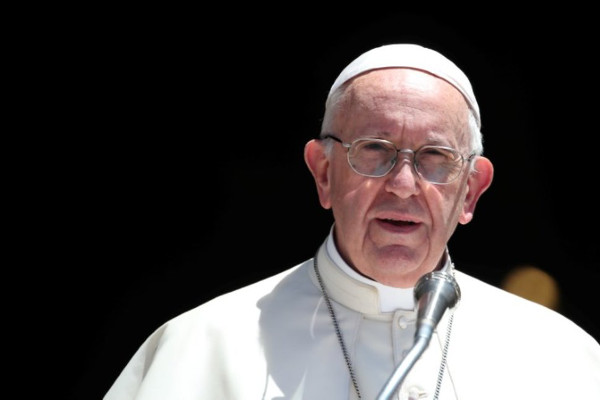
BARI, Italy (Reuters) - Pope Francis said on Saturday that building walls, occupying territories and religious fanaticism would never bring peace to the Middle East.
Speaking at the end of a summit of Christian religious leaders, Francis also repeated his view that the "status quo" of the contested city of Jerusalem should be respected, and backed a two-state solution to resolve the Israeli-Palestinian conflict.
"Truces maintained by walls and displays of power will not lead to peace, but only the concrete desire to listen and to engage in dialogue will," he said.
"Let there be an end to the few profiting from the sufferings of many. No more occupying territories and thus tearing people apart," he said.
Francis said many conflicts had been stoked by "forms of fundamentalism and fanaticism that, under the guise of religion, have profaned God’s name – which is peace – and persecuted age-old neighbors".
He said every community in the Middle East should be protected, "not simply the majority," and took a swipe at weapons procurement, saying "You cannot speak of peace while you are secretly racing to stockpile new arms".
(Reporting By Philip Pullella; editing by John Stonestreet)
***
RT
Consecrated virgins vent fury after Vatican tells them chastity not required after all
July 16, 2018
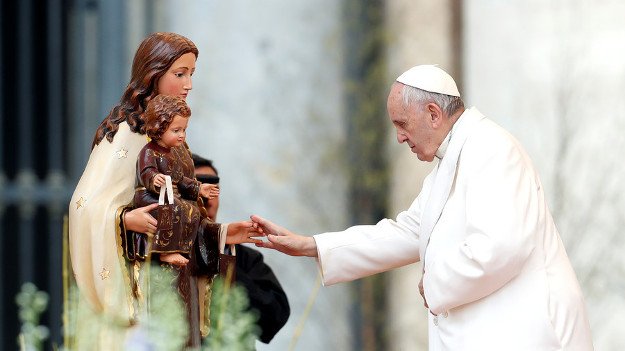
FILE PHOTO © Remo Casilli / Reuters
Consecrated virgins have expressed their shock and outrage after a Vatican document suggested that physical virginity is not a prerequisite to becoming a so-called ‘bride of Christ.’
The surprising revelation was included in a detailed guidance document on consecrated virginity, published by the Vatican earlier this month. It followed requests from bishops who reported an increasing number of women being called to the vocation.
A consecrated virgin is a woman who has never married, who pledges perpetual virginity and dedicates her life to God. Unlike a nun, the women do not live in a community and are expected to provide for themselves. There are an estimated 5,000 consecrated virgins in at least 42 countries, about 250 consecrated virgins live in the US
However, the long-awaited document has left many of the women, who made a lifelong commitment to preserve their virginity in the name of Christ, dumbfounded.
A new clause, numbered 88, suggests that it is not actually necessary for a woman, considering becoming a ‘bride of Christ’ to be physically ‘pure’ and it’s up to the individual to use their “good judgement” to discern their suitability for their vocation.
In a statement, the US Association of Consecrated Virgins said the instruction from the Vatican was “shocking” and “deeply disappointing.”
“The entire tradition of the Church has firmly upheld that a woman must have received the gift of virginity – that is, both material and formal (physical and spiritual) – in order to receive the consecration of virgins,” the statement reads.
Judith Stegman, president of the US Association of Consecrated Virgins insisted that virginity is a minimum requirement for consecration and doesn’t change “with the issuance of this Instruction.” The group also branded the guidance as “intentionally convoluted and confusing.”
The Consecration of a Virgin is one of the oldest sacramentals in the Church, dating back to the year 353. In the first three centuries, large numbers of consecrated virgins underwent martyrdom in order to remain faithful to the Lord. The new rite of consecration of virgins living in the world, published on May 31, 1970, was recognized formally by the Second Vatican council and is explained in Canon 604 of the 1982 Code of Canon Law.
***
ANCIENT ORIGINS
Return of the Ancient Gods: The Resurgence of Paganism
10 JULY, 2018 – 22:25 CALEB STROM

Over the past two centuries, Europe has become increasingly secular. Scholars in fact no longer talk of the Christian West when they speak of Modern Europe and North America, but of the Secular West. There is however evidence of a spiritual revival stirring on the continent where God is supposedly dead.
Old traditions pre-dating the appearance of the Jewish carpenter turned Messiah are beginning to re-emerge. Since the 19th century, there has been an increasing interest in ancient pre-Christian European religions such as ancient Greek, Germanic, Celtic, and Slavic paganism. This stems from an increasing interest in spirituality in Europe, specifically a spirituality in touch with European heritage and ethnic roots in a similar manner to indigenous religions of Native Americans and Aboriginal Australians.
Ancient and Modern Combine
Among modern Pagans, there are two approaches to reviving pagan practices. One is eclecticism or syncretism, in which elements of historical ethnic religions such as the ancient Norse religion are combined with modern movements such as Wicca, Theosophy or other New Age philosophies. This is largely based on romantic views of these ancient religions which emerged in the 19th century which may or may not be historically accurate.
In Iceland, the Norse gods are making a particularly strong comeback and Nordic paganism is now Iceland’s fastest growing religion. In fact, they will soon complete the first temple to Thor and Odin to exist in Iceland in over 1000 years. “I don’t believe anyone believes in a one-eyed man who is riding about on a horse with eight feet,” High priest Hilmar Örn Hilmarsson told the Guardia n. “We see the stories as poetic metaphors and a manifestation of the forces of nature and human psychology.”
Denmark too completed a pagan temple dedicated to Odin for the first time in a millennium in 2016.
Reconstructing the Past
The other approach is polytheistic reconstructionism which is an attempt to make an historically accurate reconstruction of these ancient religions based on historical sources, archaeological data, and perhaps ethnographic comparison. Reconstructionists avoid embellishing ancient pagan religions with modern movements and ideologies.
Germanic Paganism
One of the largest movements currently which can be either syncretic or reconstructionist is the revival of Germanic Paganism or “Heathenry.” Modern Germanic Pagans or Heathens, as they prefer to call themselves, worship the old Germanic gods, especially Thor and Odin as well as Germanic nature spirits such as Elves and Trolls. Germanic Heathens appear to have three different approaches to proselytizing and practicing their religion. Some Heathens emphasize simply the worship of the Germanic gods and believe that anyone regardless of their national, ethnic, or racial background can worship the Gods. These are the universalists.
There are other Heathens, however, who believe that Germanic cultural and spiritual values also need to be adopted in order to be true worshipers of the Germanic gods. Most of the latter group of Heathens also believe that worship of the Germanic gods is not limited to any particular ethnic or racial background simply that those individuals interested in worshiping them should learn something about and agree with some aspects of the culture from which they originated. Germanic Paganism is after all technically an ethnic religion. There are some Heathens however who call themselves Folkists or Folkish Heathens who believe that only those who are of White Northern European descent have any right to worship the Gods. These are the ones that tend to promote White supremacism and other explicitly racist agendas. Other Heathens, as a result, try to distance themselves from the Folkists, even those who would otherwise agree that Heathens who worship the Germanic gods should adopt Germanic values.
Slavic Paganism
Slavic Paganism or Heathenry is also enjoying a resurgence in Eastern Europe in countries with large Slavic populations. A movement known as Rodnovery or “Native Faith” is made up of communities which claim to continue the ancient Slavic religion which was mostly replaced by Eastern Orthodox Christianity. This movement is especially strong in Poland despite the nation’s dominant Catholic identity. Many Rodnovery are self-described reconstructionists but others claim direct continuity with the ancient traditions claiming that their families continued the old religion in secret or in cloaked form alongside Christianity.
Revival of the Greek Gods
In Greece, a couple of organizations have emerged promoting a revival of the ancient Greek religion under the name “Hellenism.” The Hellenists also call themselves Dodekatheists or believers in twelve gods, namely the Olympian deities. Religious practices in Hellenism include public worship at temples or in outdoor open spaces of the major Greek gods, Zeus, Apollo, Artemis, Hera, Athena, Ares, Aphrodite, Demeter, Hephaestus, Hermes, Hestia, Dionysus, Hades and Poseidon among others. There is also a large household worship component centered on domestic Greek deities such as Hestia, goddess of the hearth. Most Hellenists are politically inactive but some of them desire to create a national and ethnic identity for Greece not rooted in Eastern Orthodoxy. Some Hellenists have been vocally hostile towards the Greek Orthodox Church but many simply want to practice their religion amicably alongside Greek Christians.
The Return of Celtic Paganism
In addition to the revival of Greek, Germanic, and Slavic forms of paganism, there is also an attempt to revive Celtic paganism. There are both reconstructionist Modern Celtic Pagans and syncretic Modern Celtic Pagans who also incorporate Wicca and other traditions into their religion. Modern Celtic Pagans use the Lunar calendar of the ancient Celts and celebrate the solstices and equinoxes as well as the cross-quarter days, days that are half-way between one of the solstices and one of the equinoxes, as religious festivals. These festivals include the well-known festivals of Samhain and Imbolc. There does not appear to have been any attempt to connect Contemporary Celtic Paganism to a political agenda or nationalist movement unlike the other forms of Contemporary Paganism.
The Past Meets the Future
Religions tend to shape civilizations. When Europe became Christian and the Middle East and North Africa became Muslim, two different civilizations were formed which were quite different because of the religious traditions on which they were based. Europe most likely won’t become pagan again, but it is interesting to think of what sort of civilization would be birthed from the revival of one of these ancient religious traditions. What would a modern Pagan Greece look like culturally and politically, for example? One thing is for certain, it would go in a rather different direction than either a Christian or Secularist Greece.
***

Got Questions
Who were the Anakim / Anakites?
Question: "Who were the Anakim / Anakites?"
Answer: The Anakim/Anakites were a formidable race of giant, warlike people (Deuteronomy 2:10, 21; 9:2) who occupied the lands of southern Israel near Hebron before the arrival of the Israelites (Joshua 15:13). The Anakim’s ancestry has been traced back to Anak, the son of Arba (Joshua 15:13; 21:11), who at that time was regarded as the “greatest man among the Anakim” (Joshua 14:15).
The name “Anakim” most likely means “long-necked,” i.e., “tall.” The Hebrews thought them to be descendants of the Nephilim, a powerful race who dominated the pre-Flood world (Genesis 6:4; Numbers 13:33). When the twelve Israelite spies returned from exploring the Promised Land, they gave a frightening report of “people great and tall” whom they identified as the sons of Anak (Deuteronomy 9:2). The Israelites, seized with fear and believing themselves to be mere “grasshoppers . . . in their sight” (Numbers 13:33), rebelled against God (Deuteronomy 1:26-28) and refused to enter the land God had promised them.
The Israelites were exhorted by Moses (Deuteronomy 1:19) not to fear the Anakim, but they refused to trust God’s promises (Deuteronomy 1:32-33). As a result, God became angry (Deuteronomy 1:34-39) and prohibited the “evil generation” from entering the Promised Land; Joshua and Caleb were the only exceptions (Deuteronomy 1:35-36). Because of their fear of the Anakim and their rebellion against God, the children of Israel were forced to wander for another 38 years in the wilderness.
During the conquest of Canaan, Joshua expelled the Anakim from the hill country, and Caleb finally drove them out of Hebron completely. However, a small remnant found refuge in the cities of Gaza, Gath, and Ashdod (Joshua 11:22). Many Bible scholars speculate that the Anakim’s descendants were the Philistine giants David encountered (2 Samuel 21:15-22), including Goliath of Gath (1 Samuel 17:4-7).
(“The Amorites dwelt in their stead, wicked and sinful, and there is no people to-day which has wrought to the full all their sins, and they have no longer length of life on the earth.” Jubilees 29:11)
***
The Telegraph
Designer babies on horizon as ethics council gives green light to genetically edited embryos
The report calls for a wide public consultation to begin ahead of a change in the law CREDIT:BROWNSTOCK / ALAMY
By Sarah Knapton,s cience editor
July 17, 2018

Designer babies are on the horizon after an influential group of scientists concluded that it could be ‘morally permissible’ to genetically engineer human embryos.
In a new report which opens the door to a change in the law, the Nuffield Council on Bioethics, said that DNA editing could become an option for parents wanting to ‘influence the genetic characteristics of their child.’
Although it would be largely used to cure devastating genetic illnesses, or predispositions to cancers and dementia, the experts said they were not ruling out cosmetic uses such as making tweaks to increase height or changing eye or hair colour, if it would make a child more successful.
In the past the council has given the green light to controversial procedures, such as three-parent babies in which the DNA of a ‘second mother’ is used to replace faulty code in a cell’s batteries.
Following a widespread consultation and vote in Parliament, the law was changed to allow the procedure and the first babies with the DNA of three people are expected to be born later this year, or early in 2019.
Currently scientists are only allowed to genetically edit human embryos for 14 days for research purposes, after which they must be destroyed, and it is illegal to implant them into a womb.
But the Nuffield Council said it could become legal if safeguards were met.
Professor Karen Yeung, chair of the working party on genome editing and human reproduction: “There is potential for heritable genome editing interventions to be used at some point in the future in assisted human reproduction, as a means for people to secure certain characteristics in their children.
“Initially, this might involve preventing the inheritance of a specific genetic disorder. However, if the technology develops it has potential to become an alternative strategy available to parents for achieving a wider range of goals.
“Whilst there is still uncertainty over the sorts of things genome editing might be able to achieve, or how widely its use might spread, we have concluded that the potential use of genome editing to influence the characteristics of future generations is not unacceptable in itself.”

Asked whether genetic editing could be used to make children tall, with blond hair and blue eyes, if that was found to increase their chance of success in life, Prof Yeung added: “We’re not ruling that out.”
The Nuffield Council said that all genetic editing of embryos should be strictly regulated by the Human Fertility and Embryology Authority (HFEA) and only licensed on a case-by-case basis, with individuals monitored for long-term side-effects.
They also called for further research into genetic editing techniques such as Crispr, which acts like molecular scissors to snip away bad DNA and replace it with healthy code. The first trials to cure adults of devastating diseases like HIV, cancer and sickle cell disease, are due to get going in Europe and the US this year.
But Dr David King, Director of Human Genetics Alert said it would lead to a two-tier system where people who could not afford genetic editing would be disadvantaged
“This is an absolute disgrace," he said. "We have had international bans on eugenic genetic engineering for 30 years.
“The people of Britain decided 15 years ago that they don’t want GM food. Do you suppose they want GM babies?”
“This is neoliberal bioethics that puts individual whims ahead of society needs for basic human equality and commonality.
“Although I don’t usually use the term ‘Frankenstein science’, there is another out-of-control monster here - the scientist-dominated bioethics approval machinery that never says a clear no to anything, that insists that if we can do it, we must.”
A separate study released last night by the Wellcome Sanger Institutealso warned that Crispr is far more dangerous than previously thought.
New research, published in Nature Biotechnology, found the technique caused extensive mutations in the DNA away from the intended site. The scientists warned that it may lead to important genes being switched on or off, which may cause devastating conditions.
Prof Allan Bradley, corresponding author on the study from the Wellcome Sanger Institute, said: “We found that changes in the DNA have been seriously underestimated before now.
“It is important that anyone thinking of using this technology for gene therapy proceeds with caution, and looks very carefully to check for possible harmful effects.”
Commenting on the findings Dr Francesca Forzano, Consultant in Clinical Genetics and Genomics, Guy's & St Thomas' NHS Foundation Trust, said: “This important work demonstrate that this technique is much less safe than previously thought.
“This work represents a milestone in the gene editing field and signpost that more caution shall be exerted in the application of this technique.”
However Prof Robin Lovell-Badge FMedSci FRS, Group Leader, The Francis Crick Institute, said: “The results give no reason to panic or to lose faith in the methods when they are carried out by those who know what they are doing.”

RT
Saudi King absolves troops of any future accountability for their conduct in Yemen war
© Faisal Al Nasser / Reuters
July 13, 2108

A royal decree by Saudi King Salman has ‘pre-exonerated’ all troops fighting in Yemen from any accountability issues they may face over their conduct in the war, in which thousands of civilians have been killed and wounded.
A statement announcing the early pardon, released by Saudi Arabia's state news agency SPA, said the pardon extends to “all military men across the armed forces” taking part in Operation Restoring Hope, citing the official codename of the Riyadh-led invasion of Yemen.
The royal decree was issued following “reports submitted” by crown prince Mohammed bin Salman, the kingdom’s sitting defense minister.
It exonerates troops involved in hostilities from “their respective military and disciplinary penalties, in regard of some rules and disciplines.” The statement issued by the SPA wasn’t specific as to any particular crimes, but said the move was to show appreciation for the "heroics and sacrifices" of the soldiers.
The coalition led by the Saudi Arabia has been waging a military campaign against the Iran-backed Shiite Houthi rebels in Yemen since March 2015, in an attempt to put the ousted Yemeni president back in power. Riyadh had formed an alliance of Arab states, and their offensive initially drove the Houthis out of swathes of land in the south, but then stalled. Houthis continue to hit the Arab troops, launching surprise attacks and employing guerilla tactics.
Since the start of the Saudi-led campaign, the coalition has been repeatedly accused of killing dozens of civilians in its airstrikes but it rarely admitted responsibility for such incidents. Saudi-led forces have been repeatedly targeting civilian objects, with rights groups saying their rules of engagement amounted to war crimes. Last year, a Human Rights Watch official, Ahmed Benchemsi, told RT that 61 documented airstrikes, all conducted by the coalition, “may amount indeed to war crimes, that have killed nearly 900 civilians and have hit civilian areas, including markets, schools, hospitals and private homes.”
Later last year, a massive report presented to the UN Security Council, concluded that in eight out of ten inquiries into Saudi bombings “the panel found no evidence that the airstrikes had targeted legitimate military objectives.” In all ten investigations, the panel said “it is almost certain that the coalition did not meet international humanitarian law requirements of proportionality and precautions in attack.”
The persisting Yemen war, which entered its third year in 2018, has brought more than eight million people in the region’s poorest country to the brink of starvation. The worst humanitarian crisis in the world has seen almost two-thirds of the population struggle to provide food and basic amenities to their families.
The campaign and Saudi-imposed blockade of the impoverished nation have contributed to a humanitarian crisis in Yemen, including a major outbreak of cholera and continued malnutrition of the population, the human rights organizations say. Still, major Western powers, inducing the US and the UK, have been contributing to the Saudi war effort by selling Riyadh weapons and providing the coalition air missions with refueling and targeting intelligence.
***
***
RT
The great dollar dump: Russia liquidates US Treasury holdings
July 18, 2018

© Peter Gridley / Getty Images
Russia is continuing to diversify state reserves away from US debt. The latest data from the US Treasury shows that Russia's share hit an 11-year minimum and totaled only $14.9 billion.
The share of US sovereign debt bonds in Russia's portfolio has been reduced dramatically in recent months. Russia held $96.1 billion in US Treasuries in March before selling half its holdings in April, dropping to 22nd place among major foreign holders of American treasury securities at $48.7 billion.
In 2010, Russia was among the top 10 holders of US Treasuries at $176.3 billion. With its holdings falling to $14.9 billion in May, the country is now below the $30 billion threshold for inclusion on the Treasury Department’s monthly report of major holders. On Tuesday, the Treasury released a list of 33 countries which includes the biggest holder China to the smallest Chile. Russia is no longer on the list.
A treasury bond is a fixed-interest government debt security with a maturity of more than 10 years. Treasury bonds make interest payments twice a year. The gradual sell-off of US sovereign debt started in 2011, and has intensified over recent years amid numerous rounds of sanctions imposed by the White House against Russia.
The head of the Central Bank of Russia (CBR) Elvira Nabiullina said in May that slashing of the holdings was result of the systematic assessment of all kinds of risks, including financial, economic and geopolitical.
Meanwhile, Russia’s gold holdings have been steadily increasing, bringing its share of the precious metal to its highest level in nearly two decades. Russia’s gold holdings in May grew by one percent to 62 million troy ounces, worth $80.5 billion, according to the CBR. According to Nabiullina, gold purchases helped to diversify reserves.
Global geopolitical conflicts along with trade tensions triggered by the US earlier this year have made some countries follow suit. Turkey nearly halved its US Treasury holdings from almost $62 billion in November to $32.6 billion in May. Germany has reduced its holdings from $86 billion in April to $78.3 billion in May.
Asked about Russia’s absence, a US Treasury spokesman said the Treasury market is the deepest and most liquid in the world, and demand remains robust, reports Bloomberg. He added that the department doesn’t comment on individual investors or investments.
***
RT
Only in Russia: New armored vehicle airdropped WITH crew during 'historic' drills
July 17, 2018

© mil.ru
The Russian military has successfully tested a new airmobile armored personnel carrier during large-scale drills in central Russia. The APC was parachuted with a crew onboard – a daring technique used only by Russian troops.
Over 200 armored vehicles and some 2,500 servicemen took part in the joint drills of Transport Aviation and Airborne Troops, which concluded on Friday. One highlight of the exercise was the airdrop of a new APC – complete with a crew on board.
"The drills went well. The personnel is ready to carry out combat missions. The airdrop of the BTR-MDM with the test crew inside is a historic event," chief of Military Transport Aviation Lieutenant General Vladimir Benediktov told reporters. No other military in the world has successfully implemented the risky technique, instead of parachuting vehicle crews separately from their machines.
Dropping vehicles with a crew inside allows them to get combat-ready within minutes after the airdrop. The unique technique was conceived and implemented by the legendary commander of the Airborne troops, Army General Vasiliy Margelov.
The very first airdrop of its kind was performed back in 1973 with Margelov's son, Aleksandr, personally taking command of the test vehicle. The elder Margelov wanted to go himself, but the Soviet leadership did not permit it.
Naturally, such airdrops require the most reliable kind of equipment, as any malfunction would spell certain death for the servicemen. Not to mention the material losses – a certain sabotaged NATO airdrop in 2016 provided an example of what happens to a combat vehicle after a freefall from a plane.
The BTR-MDM armored personnel carriers (APC) were adopted by the Russian military back in 2015, but they've never been airdropped with a crew inside until this latest exercise. The vehicle and its crew safely parachuted from an altitude of over 1,800 meters (over 5,900 feet). The new machine weighs nearly 14 tons and houses two crewmembers and 13 paratroopers. Its predecessor, the BTR-D, weighs only eight tons.
Apart from the new APCs, the paratroopers used two different types of parachutes during a jump from a single plane for the very first time – the rusted Arbalet-3 and new Tandem Military parachute system. The latter parachute is undergoing final testing and is expected to get to the Airborne Troops en masse before the end of this year.
All in all, over 200 armored vehicles and some 2,500 servicemen took part in the drills. The Ryazan Airborne Regiment was bolstered with two battalions of airmobile self-propelled 2S9 Nona mortars, D-30 towed howitzers, an anti-aircraft squad and other units. Several observation UAVs were also engaged in the exercise. Transport aviation brought various planes, such as the iconic Il-76 and An-124.
***
RT
‘US law doesn’t apply here’: India’s defense chief resists pressure over S-400 deal with Russia
© Sergei Karpukhin / Reuters
July 14, 2018

American laws are their own matter locally and have nothing to do with India, the country’s defense chief said, refusing to bow to a US sanctions threat over its planned purchase of Russian S-400 air-defense systems.
New Delhi has relayed to Washington that the threat of unilateral US sanctions will not have an impact on its decision on the possible purchase of S-400 Triumf air defense missile systems from Russia.
“We have told the US Congress delegation that this is US law and not a UN law,” India's defense minister Nirmala Sitharaman noted, apparently referring to a US federal bill that was implemented in 2017.
The so-called Countering America’s Adversaries Through Sanctions Act (CAATSA) mandates the US administration to punish entities engaging in significant transactions with Russia’s defense sector companies.
Refusing to bow to the threat of potential sanctions, Sitharaman said that the 39,000 crore ($5.7bn) deal to purchase five S-400 units has nearly been finalized. “Our defense relation with Russia has endured several decades and we have conveyed this about it to a US Congressional delegation which visited India recently,” Sitharaman told a group of reporters at her office in South Block.
The deal is expected to be finalized by the fall, to be sealed during a summit between Prime Minister Narendra Modi and President Vladimir Putin in India this October. The S-400 Triumf is the most advanced Russian anti-aircraft system available for export, designed to engage aerodynamic targets at a range of up to 400km and ballistic missiles up to 60km away. One S-400 division can engage up to 36 targets simultaneously, while the launcher can use at least four interceptor missile types, suited to different targets.
India is not the only country that is being pressured by Washington because of plans to purchase Russia’s S-400. US lawmakers have been threatening sanctions against Turkey and are seeking to ban F-35 deliveries if Ankara goes ahead with the deal.
***
Zero Hedge
You Now Can't Leave The U.S. Unless The IRS Lets You
By Tyler Durden
July 13, 2018
Authored by Ryan McMaken via The Mises Institute,

When it comes to human migration, nearly everything we hear nowadays in relation to the United States and Europe is related to immigration into North America and Europe.
Historically, however, governments have often been as concerned with emigration as they have been with immigration.
This is not surprising since government have always attempted to "monopolize the legitimate means of movement" as noted by historian John Torpey. For Torpey, author of The Invention of the Passport: Surveillance, Citizenship and the State, a preferred method of "regulating international movement" has been the passport. Wendy McElroy puts things less subtly when she describes the passport as a tool the state can use to "exert social control by refusing travel to 'enemies of the state.'"
It should not be surprising, then, that the US government is now cracking down on Americans who have outstanding tax bills — by holding their passports hostage. This could affect more than 360,000 Americans.
Former Congressman Bob Barr notes this week:
In an extremely troubling move three years ago, the Republican-controlled Congress handed the Internal Revenue Service the power to strip individuals of one of the most important and tangible rights possessed by American citizens – their passports. The Service is now starting to use this hammer.
Barr rightly points out that, given we already know the IRS uses its power to target political enemies, this new power of the agency is especially troubling.
He also asks how long other agencies might demand similar power from Congress, such as the power to stop a citizen's ability to "secure a driver’s license, obtain[...] a loan from a federally-insured financial institution, or clear[...] a background check prior to purchasing a firearm?"
These sorts of powers have long been used by abusive and authoritarian states. But the ability to regulate movement through emigration and travel controls are especially attractive to states.
The US, of course, has long been especially contemptuous of potential emigrants, as "the United States is one of only two countries (the other being Eritrea) that taxes its citizens no matter whether they reside." This acts as a sizable disincentive to Americans looking to move abroad.
And now, if you fail to pay taxes while living outside the US, the IRS can simply revoke your passport if you return to the states.
A Brief History of Emigration Controls
With this sort of behavior, the US government has joined the long list of governments which over the centuries have attempted to use their coercive powers to control the flow of emigrants outside their jurisdictions. Historian David Fitzgerald has noted:
While the academic tendency to ignore emigration policies implies that they either don’t exist or don’t matter, all major European states had significant emigration controls at some point.. States can execute those who attempt to leave, force emigrants to pay stiff exit fees, refuse to issue passports, prevent departure with personal property, and strip emigrants of their nationality. ... Discursive techniques are also available, like publicly deriding emigrants as traitors to the motherland. Local governments have multiple pressure points where they could limit the transmission of vital records, assistance with lost or stolen remittances, and other bureaucratic transactions with emigrants. In short, governments have a potentially large and effective tool kit to make emigration an unpleasant experience, especially as many emigrants leave home with at least the illusion of returning
We don't hear much about emigration controls anymore, though, thanks to the (partial) success of laissez-faire liberalism:
Most Western European states stopped trying to restrict emigration in the nineteenth century because of a shift from a mercantilist policy of hoarding population to laissez-faire capitalism allowing workers greater freedom of movement to sell their labor, and the related ascendancy of a right to exit in liberal political philosophy.
Fitzgerald's work specifically focuses on pre-1970s Mexico as a case study in emigration control. Mexican nationalists had long yearned to prevent emigration by a variety of means, fearing both domestic labor shortages and "national humiliation" caused by large outflows of emigrants. In 1904, for example, "Mexican federal and state authorities ordered municipal governments to stop issuing travel documents used by U.S.-bound workers." Similar measures were used over the years, but Mexico's liberal constitution, and the realities of a decentralized political system, made it difficult to control emigrants.
Mexico was hardly alone in its nationalism-inspired opposition to emigration, especially during the late nineteenth century and early twentieth century.
In Europe, efforts to refuse emigration outright, and in general, were usually rejected, but efforts were made to prosecute those who facilitated emigration.
In the late nineteenth century, for example, these so-called "emigration agents," who usually were in the business of helping people re-locate to the United States, sometimes faced criminal prosecution. According to Tara Zahra in The Great Departure: Mass Migration from Eastern Europe and the Making of the Free World, "In 1914, over three thousand agents faced criminal charges in the Austrian half of the monarchy... They were clearly orchestrated as a warning to would-be emigrants about the hazards of leaving home."
Often the agents were accused of human trafficking or of swindling their customers. It is likely that these accusations were true some of the time, but the the motivation behind efforts to discredit these travel agents appears to have been more nationalism than consumer protection.
According to Zahra, over time, these attacks on emigration agents were only one part of a wide variety of anti-emigration laws in Europe:
The English Passenger Vessel Act of 1803, initially intended to monitor shipping firms, were gradually expanded to regulate emigration agents, labor brokers, and rooming houses, in order to protect migrants from unscrupulous brokers. Laws passed in France in 1854 and Belgium in 1876 required emigration agents to obtain licenses. The Swiss government was the first to ban advertising for emigration completely. Closer to home, Bohemian authorities banned emigration agencies in the 1850s. Other laws regulating emigration followed in Japan (1896), Germany (1897), Italy (1901), and Hungary (1903). The Hungarian law was the most restrictive to date, and it became a model for legislation across East Central Europe after World War I.
In the Hungarian legislation in question, "Hungarian men were not legally permitted to emigrate after their seventeenth birthday without written permissions from the Defense and Interior Ministries." The stated purpose of many of these laws was the "protection" of citizens who exposed themselves to potential danger and impoverishment by emigrating.
Anticipating the American policy of revoking passports of alleged tax delinquents, German states required that emigrants "settle all debts and taxes" before being allowed to leave.
In some cases, as in Russia, an "emigrant" passport was available only after paying a stiff "fee" and the document was a one-way ticket out of the country. Return was forbidden, and ensured an emigrant was cut off from family ties. It also meant the emigrant risked statelessness if unable to enter the destination country.
The Russian distaste for emigration, of course, brings to mind the years of the Iron Curtain when emigration controls were used across Eastern Europe. Indeed, when modern people think of recent emigration-control efforts, they tend to think of the Berlin Wall and the communist world in general. But these controls weren't limited to communist countries. The Nationalist Chinese regime in Taiwan was known to use emigration controls up until the 1980s.
Often, these laws were selectively enforced. Emigrants with property were often stripped of their property or simply barred from emigrating. Less desire potential emigrants were allowed, or even encouraged to leave. In multi-national Austria-Hungary, for example, local officials often encouraged minority ethnic groups to leave, in order to solidify the majority of the locally dominant ethnic group. The was sometimes then accompanied by efforts by ethnic nationalists to prevent emigration by members of the locally-dominant ethnic group. Then as now, migration policy, whether involving immigrants or emigrants, was employed with the hop of manipulating demographics.
The American Embrace of Emigration Surveillance and Control
In turning to greater use of emigration controls, the US is embracing ever greater control of its domestic population and its resources. Such oversight of US citizens, however, was almost completely unknown in the nineteenth century. As McElroy notes:
passports were not mandatory [in the United States] except for a period during the American Civil War (1861–1865) and during World War I (1914–1918). The latter can be seen as the beginning of the current American passport. On December 15, 1915, President Woodrow Wilson issued Executive Order No. 2285, "[r]equiring American citizens traveling abroad to procure passports" and advising the "Secretary of State, in co-operation with the Secretary of the Treasury, will make arrangements for the inspection of passports of all persons, American or foreign, leaving this country."
Passport law varied between permissive and restrictive until World War II, after which passport mandates became nearly universal. As is so often the case, the state uses war and foreign policy interests as excuses to crack down on domestic freedoms.
Nor did taxation of non-citizens exist until the twentieth century with the advent of the income tax. There had been efforts to tax all emigrating American citizens indefinitely before this. But it was only after the passage of the sixteenth amendment, and the Supreme Court's ruling in Cook v Tait, that taxation of American emigrants became well-established in American law.
During the Cold War, politicians were often keen on comparing the United States to the Soviet Union and pointing out how many freedoms Americans enjoyed compared to the Soviet. Free emigration was one of the freedoms.
In the United States of 2018, though, you're only free to leave if the IRS says so — and as long as you keep paying taxes to the US government indefinitely, no matter where you are. Many of the anti-emigration laws of nineteenth-century Europe looks positively enlightened in comparison.
***
NY Times
The power of positive people
By Tara Parker-Pope, July 10, 2018

Are you spending time with the right people for your health and happiness?
While many of us focus primarily on diet and exercise to achieve better health, science suggests that our well-being also is influenced by the company we keep. Researchers have found that certain health behaviors appear to be contagious and that our social networks–in person and online–can influence obesity, anxiety and overall happiness. A recent report found that a person’s exercise routine was strongly influenced by his or her social network.
I was reminded recently of the power of the crowd during a wellness cruise sponsored by Times Journeys. The event attracted a group of like-minded travelers who, despite experiencing various levels of adversity in their lives, including cancer, vision loss and the recent loss of a loved one, were remarkably optimistic and upbeat. The group ranged in age from 17 to 90. One inspiring man, in his 80s, had adopted a vegan lifestyle and a strict exercise routine to control his diabetes. Another new friend, a woman in her 50s who had survived lung cancer, cheered me on and kept me going during a particularly difficult workout.
After the trip, we all promised to keep in touch. Buoyed by the experience, I returned home with a renewed commitment not only to exercise and healthful living, but to simply step up my social life and spend more time hanging out with happy people.
Dan Buettner, a National Geographic fellow and author, has studied the health habits of people who live in so-called blue zones–regions of the world where people live far longer than the average. He noted that positive friendships are a common theme in the blue zones.
“Friends can exert a measurable and ongoing influence on your health behaviors in a way that a diet never can,” Mr. Buettner said.
In Okinawa, Japan, a place where the average life expectancy for women is around 90, the oldest in the world, people form a kind of social network called a moai–a group of five friends who offer social, logistic, emotional and even financial support for a lifetime.
“It’s a very powerful idea,” Mr. Buettner said. “Traditionally, their parents put them into moais when they are born, and they take a lifelong journey together.”
In a moai, the group benefits when things go well, such as by sharing a bountiful crop, and the group’s families support one another when a child gets sick or someone dies. They also appear to influence one another’s lifelong health behaviors.
Mr. Buettner is working with federal and state health officials, including the former United States Surgeon General Vivek Murthy, to create moais in two dozen cities around the country. He recently spent time in Fort Worth, Tex., where several residents have formed walking moais–groups of people who meet regularly to walk and socialize.
“We’re finding that in some of these cities, you can just put people together who want to change health behaviors and organize them around walking or a plant-based potluck,” he said. “We nudge them into hanging out together for 10 weeks. We have created moais that are now several years old, and they are still exerting a healthy influence on members’ lives.”
The key to building a successful moai is to start with people who have similar interests, passions and values. The Blue Zone team tries to group people based on geography and work and family schedules to start. Then they ask them a series of questions to find common interests. Is your perfect vacation a cruise or a backpacking trip? Do you like rock ‘n’ roll or classical music? Do you subscribe to The New York Times or The Wall Street Journal?
“You stack the deck in favor of a long-term relationship,” said Mr. Buettner.
One of my fellow travelers, Carol Auerbach of New York City, noted that surrounding herself with positive people has helped her cope with the loss of two husbands over the years. Ms. Auerbach was widowed at 30, when her children were just 2 and 5. With the support of her family and friends, and her own tenacity, she was able to support her family, and she eventually remarried. And then in 1992, her second husband died unexpectedly. To cope the second time, she focused on volunteer work and contributing to her community.
Ms. Auerbach said she believes that she learned to have a positive outlook from her mother, a Holocaust survivor who left Germany at the age of 19 and never saw her parents again.
“When I was growing up we were not affluent, and the four of us lived in a one-bedroom apartment, and my parents slept on a pullout sofa,” she said. “My mother never complained. I think she quietly knew that difficult things happen, but you feel very appreciative of the life you do have, and you feel a responsibility to make the most of it.”
Ms. Auerbach eventually found love again and has been married to her third husband for 15 years. “Life is too short to be around negative people,” she said. “I need people around me who care about me and are appreciative, and see the world as a glass half full, not half empty.”
The Blue Zone team has created a quiz to help people assess the positive impact of their own social network. The quiz asks questions about your friends and the state of their health, how much they drink, eat and exercise, as well as their outlook. The goal of the quiz is not to dump your less healthy friends, but to identify the people in your life who score the highest and to spend more time with them.
“I argue that the most powerful thing you can do to add healthy years is to curate your immediate social network,” said Mr. Buettner, who advises people to focus on three to five real-world friends rather than distant Facebook friends. “In general you want friends with whom you can have a meaningful conversation,” he said. “You can call them on a bad day and they will care. Your group of friends are better than any drug or anti-aging supplement, and will do more for you than just about anything.”
***
Until
next week...keep on believing.
Almondtree Productions
“Rejoice
in the Lord alway: [and] again I say, Rejoice.”
(Philippians
4:4)